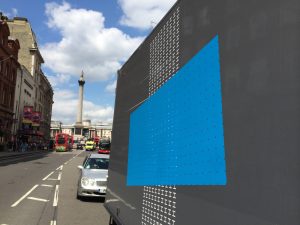In the third and final part of our report on ICEFAT’s members’ responses to the Covid-19 pandemic, we discuss the plans our members have made for their work in the future. In the months and weeks ahead, our agents are devising strategies to cope with the challenges brought about by the pandemic.

Tandem van in London
Long-term challenges from Covid-19
Covid-19 continues to be on the rise in many countries, and ICEFAT members are operating in regions where the disease is expected to exist for a long time yet. India is one of those countries still seeing a daily rise in infection rates, and Mithals International are expecting the peak to be more than a month away yet. They are hopeful, however, that the country’s neighbours’ success so far in tackling the virus will mean that air freight rates will not spike again. No matter the global infection rates over the next few months, Al Mithal of Star Worldwide sees “long term challenges with regard to compliance of health and quarantine regulations in different countries and the costs associated with the enhanced health and safety standards.”
In Germany, where efforts against the virus have been largely successful so far, Tandem remains hesitant, although Klaus Hillmann suspects “a reduction in the restrictions on our work will be accompanied by an increase in the volume of orders.” He also warns that it is too early for “concrete forecasts.” Despite a local lockdown recently being reinstated in the country, there is little sign that the virus is resurging there to any great extent yet this vindicates Hillmann’s wary stance.
It is expected that taking the necessary precautions will reduce the speed at which shippers will be able to deliver their services. Greg Gahagan at Ship/Art welcomes this pace change caused by the necessary efforts to stop the spread of the virus. He says: “Our old normal was pretty fast and prioritized the safety of the art and the needs of the clients. Covid-19 is forcing us to slow down to rethink things and keep our people safe.”
Clients have been understanding of the changes required to ICEFAT agents’ services. Work with private clients is the area in which there is most risk as there tends to be less space compared to an open-plan museum or gallery. The risk with these clients has been as controlled as possible by shippers. “Many private clients have thanked us for our work to keep them safe while we are in their homes and they take their own precautions while we are on site,” says Kerry Thompson of PACART, showing the cooperation needed between shippers and clients to limit the spread of the virus.

Gander & White truck outside the Bass museum in Florida
The Problem of Museum Couriers
The pandemic meant that the majority of the world’s museums shut their doors, and loans to other institutions completely halted. For museums reopening once more the still extant disease has brought about a challenge in how fine art shippers would work with museum couriers – museum professionals who accompany loaned works from their parent institution to ensure they are properly transported and installed. Before the pandemic, couriers would ride along with the shippers, but the necessity for social distancing means this can no longer be carried out.
As ever, ICEFAT technicians act as eyes and ears for their clients when shipping artworks and artifacts, and this will not change. Sara Volani of Züst & Bachmeier says her company has begun to offer more of their services of airport supervision if the museum courier cannot travel. The case is the same in India, where Star Worldwide is ensuring airport supervision at origin, destination, and transit stops in order to mitigate risks. The company is also seeing appointments of local registrars at destination that are managing some of the responsibilities usually handled by the courier that travels from the originating institution.
Where couriers are required for insurance purposes, a solution is necessary, however. Alexander Bradford of Gander & White notes that their UK services are waiting for further clarity of regulations from the government on this and are working with museum stipulations on a case-by-case basis. In the US, Ship/Art’s current practice is to have couriers ride in follow cars in order to satisfy social distancing requirements. A similar case can be found in France, where Crown Fine Art’s Paris operation uses ‘corona-proof’ cars to transport couriers.
The use of ‘virtual couriers,’ where the responsible museum courier carries out their required checks via video rather than in person, looks to be the most promising solution. ICEFAT shippers such as Italy’s Apice are already doing this, as are many institutions. If this can be universally established, virtual couriers could potentially eliminate logistical challenges and travel expenses for couriers in the long-term. Jonathan Schwartz of Atelier 4 is involved in a conversation with a group of 85 museum registrars who are in the process of codifying virtual courier standards. However, he says “for now, US Indemnification calls for physical accompaniment by a museum representative on flights, so those shipments will have to wait until jump seats and cargo on wide body passenger flights are allowed.” The current situation means that institutions would have substantial difficulty in arranging a show that included works that required a courier.
Even before the courier issue became a problem, there was uncertainty in the European ICEFAT membership over how many technicians could travel in one vehicle in the EU. Two technicians in a vehicle were no longer possible in many places. A Ta
ndem vehicle with two occupants from Germany was stopped from travelling in Belgium and also turned away at the Swiss border for the same reason. Other shippers, in France and the Netherlands, however, have not reported any restrictions to cab passengers when crossing EU borders. ICEFAT’s European agents are awaiting confirmation on the current rules for this.
The Covid-19 pandemic of 2020 has had a profound effect globally in all areas of society, the cultural sector included. The fine art shippers of ICEFAT are continuing to weather its effects, with the awareness that it has not only meant a widescale pause to their work but also that it has led to changes to the way we operate. From remote work to virtual couriers, ICEFAT’s membership will continue to find innovative solutions to new challenges, continue its important work as the “unseen engine room of the art world.”



